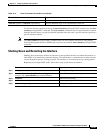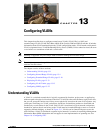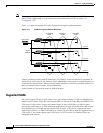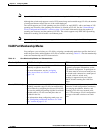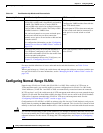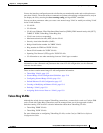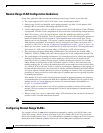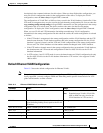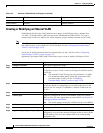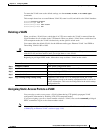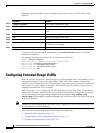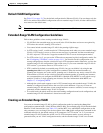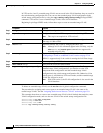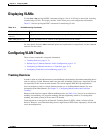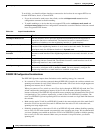
13-7
Catalyst 2960 and 2960-S Switch Software Configuration Guide
OL-8603-09
Chapter 13 Configuring VLANs
Configuring Normal-Range VLANs
description in the command reference for this release. When you have finished the configuration, you
must exit VLAN configuration mode for the configuration to take effect. To display the VLAN
configuration, enter the show vlan privileged EXEC command.
The configurations of VLAN IDs 1 to 1005 are always saved in the VLAN database (vlan.dat file). If the
VTP mode is transparent, they are also saved in the switch running configuration file. You can enter the
copy running-config startup-config privileged EXEC command to save the configuration in the startup
configuration file. In a switch stack, the whole stack uses the same vlan.dat file and running
configuration. To display the VLAN configuration, enter the show vlan privileged EXEC command.
When you save VLAN and VTP information (including extended-range VLAN configuration
information) in the startup configuration file and reboot the switch, the switch configuration is selected
as follows:
• If the VTP mode is transparent in the startup configuration, and the VLAN database and the VTP
domain name from the VLAN database matches that in the startup configuration file, the VLAN
database is ignored (cleared), and the VTP and VLAN configurations in the startup configuration
file are used. The VLAN database revision number remains unchanged in the VLAN database.
• If the VTP mode or domain name in the startup configuration does not match the VLAN database,
the domain name and VTP mode and configuration for the first 1005 VLANs use the VLAN
database information.
• In VTP versions 1 and 2, if VTP mode is server, the domain name and VLAN configuration for only
the first 1005 VLANs use the VLAN database information. VTP version 3 also supports VLANs
1006 to 4094.
Default Ethernet VLAN Configuration
Table 13-2 shows the default configuration for Ethernet VLANs.
Note The switch supports Ethernet interfaces exclusively. Because FDDI and Token Ring VLANs are not
locally supported, you only configure FDDI and Token Ring media-specific characteristics for VTP
global advertisements to other switches.
Table 13-2 Ethernet VLAN Defaults and Ranges
Parameter Default Range
VLAN ID 1 1 to 4094.
Note Extended-range VLANs (VLAN IDs
1006 to 4094) are only saved in the
VLAN database in VTP version 3.
VLAN name VLANxxxx, where xxxx represents four numeric
digits (including leading zeros) equal to the VLAN
ID number
No range
IEEE 802.10 SAID 100001 (100000 plus the VLAN ID) 1 to 4294967294
MTU size 1500 1500 to 18190
Translational bridge 1 0 0 to 1005
Translational bridge 2 0 0 to 1005



